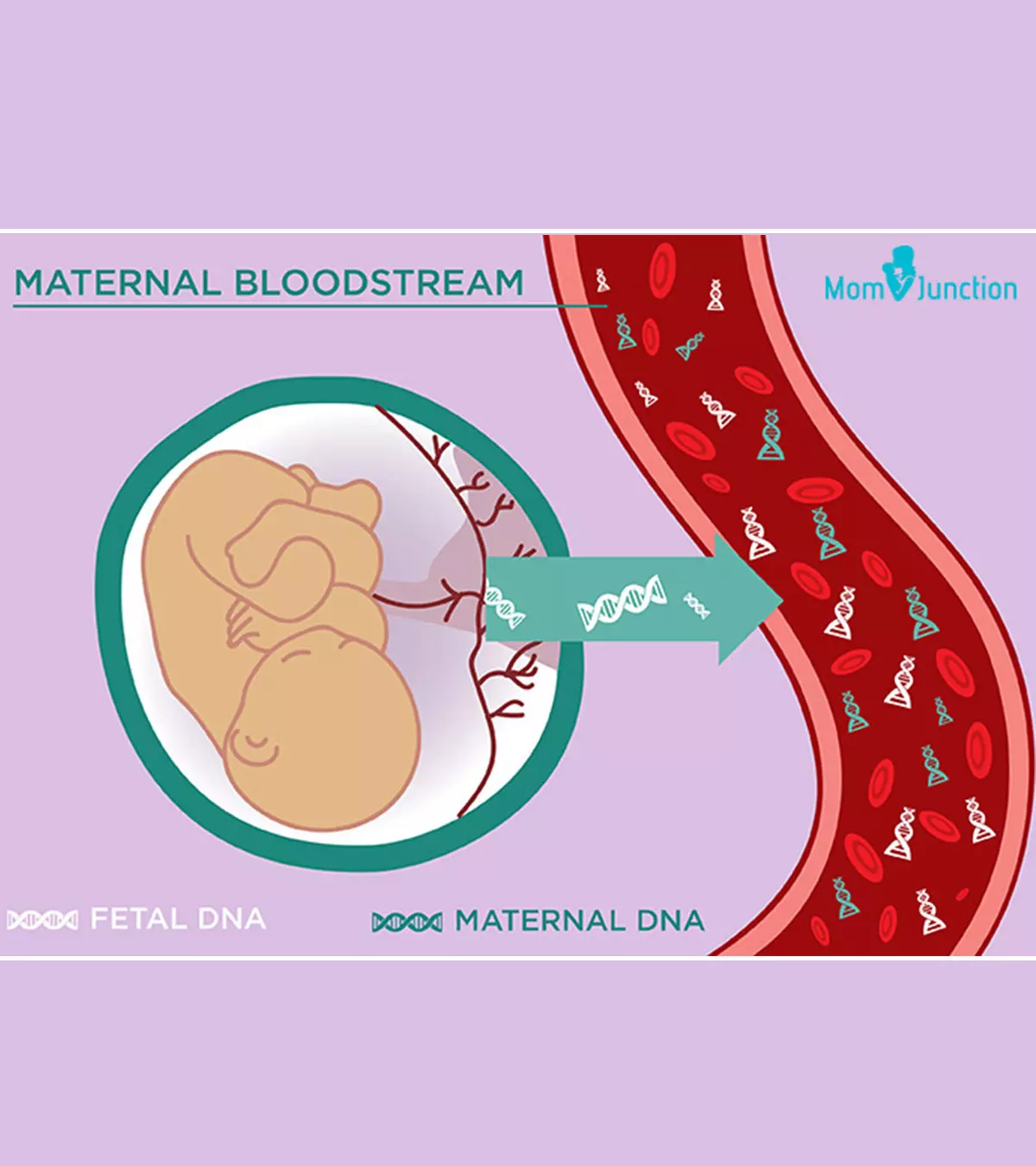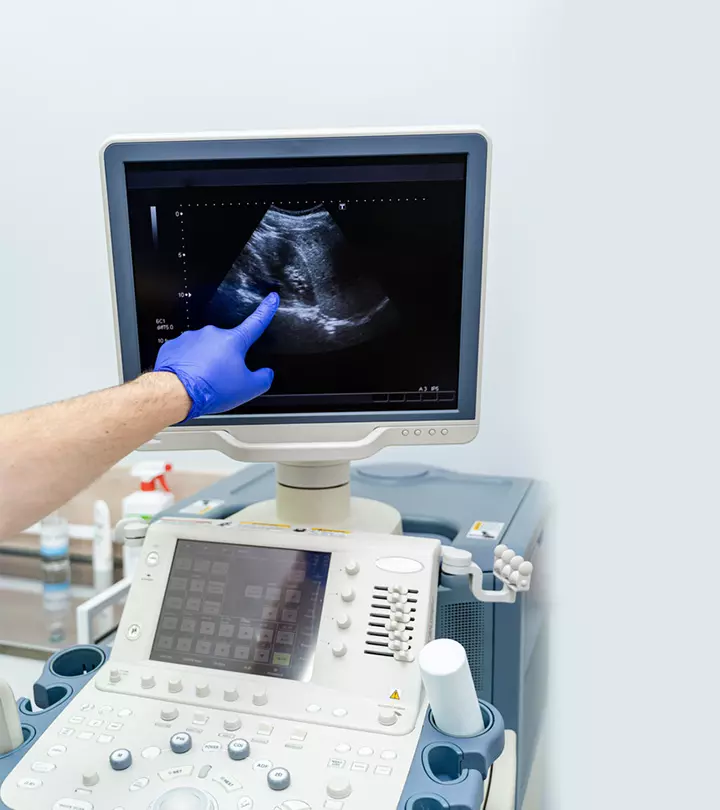
Image: ShutterStock
You may have often heard people telling you not to bend over when pregnant. Even some pregnant women believe that bending over may adversely harm their baby. But, you might wonder if bending is always harmful to you or the baby. What underlying factors state that bending is dangerous during pregnancy?

This post is intended to answer such questions and concerns you may have about bending posture during pregnancy.
Key Pointers
- Expectant mothers can bend during pregnancy as long as it is done properly.
- Bend at the hips and knees rather than the back, especially in later stages of pregnancy.
- Be extra cautious in the last months as the baby bump can affect balance.
- Bending incorrectly during pregnancy can cause lower back pain, acid reflux, heartburn, and dizziness.
- Round ligament pain, a common issue during pregnancy, can be eased by avoiding sudden movements and bending at the waist.
- When lifting objects, bend your knees and keep your back straight to avoid falling or straining your back.
- It is safe to bend at the hip joint and knees instead of the spine, especially in the later stages of pregnancy.
How Safe Is It To Bend During Pregnancy?
For a woman enjoying a healthy pregnancy sans any complications, bending seldom harms maternal and fetal health. The amniotic fluidiThe clear fluid that surrounds the baby in the uterus surrounding the fetus serves as a protective shield (1). However, as the pregnancy progresses, the growing baby bump may make it difficult for an expectant mother to bend down.
Parmeet Kaur, pelvic flooriGroup of muscles present at the base of the pelvis specialist from Calgary, Alberta, says, “When pregnant, it is safe to bend over. The baby is well cushioned by the abdominal muscles, uterine wall, and amniotic fluid, allowing them to move around freely. However, there are some risks associated with bending over during the later stages of pregnancy, such as tripping or losing balance and falling. Therefore, it is best to avoid bending over during the later stages of your pregnancy, especially if you are not comfortable doing so.”
When Is It Safe Or Not Safe To Bend During Pregnancy?
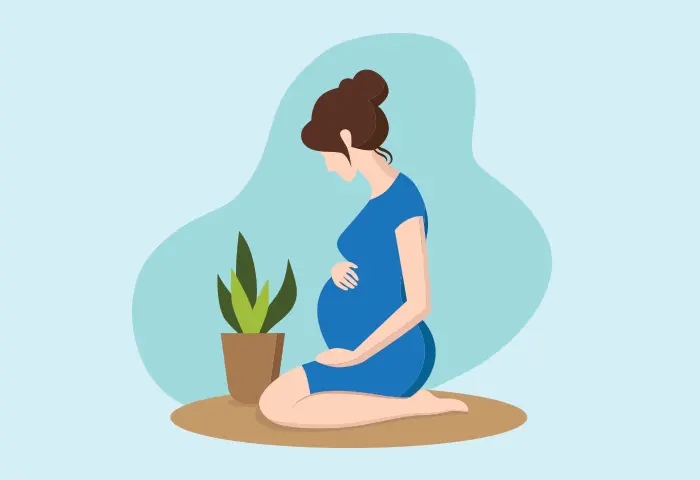
Experts say there is no problem in bending as long as it is done in the correct manner, that is at the hip joint rather than at the spine and at the knees. The US National Institute for Occupational Safety and Health (NIOSH) states that the safety of bending during pregnancy can depend on several factors, including the woman’s health, general physical activity, fitness, and stage of pregnancy (2).
However, the NIOSH observes that “Jobs involving very high physical demands, for example bending at the waist more than 20 times per day may increase risks for some adverse birth outcomes.”
In the first trimester, a woman can bend without any impact on the fetus, which is still quite small in size (3). Research indicates no link between bending, lifting, or working hours and the risk of miscarriage during the first trimester (4). However, if there are complications in the pregnancy, then your doctor might ask you not to bend too often. Bending may not be a problem in the second trimester as well. However, it might cause some inconvenience to you.
In the third trimester, the growing baby bump brings about a shift in the center of gravity and as a result, you may lose balance while bending (5). Therefore, you need to be extra careful.
In any stage of pregnancy, it is good to bend at your knees rather than bending at your waist.
Inconveniences Caused By Bending During Pregnancy

Physical movements such as bending might become difficult during pregnancy due to weight gain each month. Along with general difficulty, the following are a few other inconveniences you might have when bending during pregnancy.
- Pain in the lower back: The growing baby can weaken the abdominal muscles and put extra strain on the back muscles. It can lead to back pain. Bending forward at this stage may further aggravate the back pain (6).
 Be watchful
Be watchful- Acid reflux and heartburn: Research suggests that bending might aggravate gastroesophageal refluxiA backward flow of stomach acids into the esophagus and heartburn, especially during the second and third trimesters (7). Bending may exert extra pressure on the stomach, thus making the stomach acid to reflux into the food pipe.
 Caution
Caution- Dizziness: Sometimes, bending too often during the third trimester causes increased blood flow to the head, resulting in dizziness.
What Causes The Stomach To Hurt While Bending During Pregnancy?
The pain may be an outcome of a muscle strain or minor muscular injury. Hormones during pregnancy can loosen joints and relax muscles, especially the pelvic floor muscles (9). It may increase susceptibility to back and joint pains while performing physical tasks like bending during pregnancy. It is good to report any pain to your doctor.
While occasional bending and stretching are not known to cause any internal problems, you need to be careful to avoid any accidents.
Kaur says, “As a pregnant woman’s baby grows, the ligaments in the uterus also grow. While you are pregnant, you might feel a sharp pain when moving or changing positions. This pain is often localized around your low belly and groin; it is called round ligamentiA fibro-muscular connective tissue that supports the uterus on both sides pain. I advise patients to take precautions such as avoiding sudden movements and bending from the waist to help reduce the occurrence of round ligament pain.”
Precautions To Take While Bending Down During Pregnancy
If you need to bend for some reason, then you may follow these precautions.
- Use proper bending techniques: If you need to pick or lift an object from the ground, then bend your knees, and get into a squat position, instead of bending your back (10). You may also use support, like a chair or stable surface when picking something up from the ground. The idea is to bend at the knees and not the waist (9). Also, avoid making any sudden or jerking movements while lifting during pregnancy (11). This posture may reduce the chances of falling and could reduce exertion on the back.
Kaur recommends, “Always tuck your chin and keep your back straight to avoid straining the lower back muscles. If you need to pick something up from the floor, squat down instead of bending over. I tell my patients to avoid bending at the waist if it hurts, use your legs to bend in a squatting-like motion.”
- Getting up from a sitting position: You should also be careful while getting up from a sitting position. Do not get up with a jerk. Instead, shift to the edge of your chair and stand up by straightening your legs, avoiding forward bending at the waist (12).
- Avoid lifting heavy objects: Refrain from lifting and holding heavy objects below mid-shin level, that is holding them while still bending. It can cause prolonged strain on the back muscles and may also shift the center of gravity, thus increasing the risk of a fall. Studies have shown that lifting weights of 12kg or more over 50 times per week can significantly increase the risk of preterm birth, particularly among women who stop working before the 32nd week of pregnancy (13).
- Be mindful of balance: Use proper bending techniques and take your time with movements. It may help you to stay steady on your feet. Try to avoid twisting your torso when bending. Instead, turn your whole body to face the object you are picking up.
- Listen to your body: If you experience pain or discomfort while bending, stop immediately and return to an upright position. Share these experiences with your doctor to get personalized advice based on your situation.
Along with precautions while bending, you may practice some safe body postures to ensure good musculoskeletal health during pregnancy.
Tips To Maintain Healthy Body Postures During Pregnancy
Be it sitting, standing, or driving, maintaining proper body mechanics and postures helps avert any strain during pregnancy.
- Posture while sitting: Keep your spine and shoulders straight while seated. Avoid slumping into the chair. For a good posture, tilt your pelvis forward to prevent the back from sagging, and consider using back support cushions while sitting for added comfort. Keep your feet touched to the ground and avoid crossing them since it may impair blood circulation (14).

- Posture while standing: Keep your feet a bit apart and your pelvis inwards by tucking your buttocks to the inside. Hold the knees in a relaxed position and shoulders held back instead of hunching. Distribute the body weight evenly on both feet. If you need to stand for an extended period, try placing one foot on a small step stool. It will help reduce the strain on your lower back by shifting some weight off that area (15).
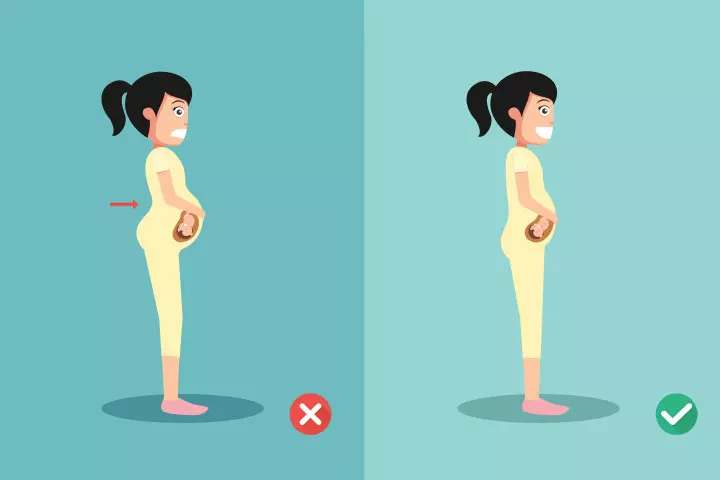
- Posture while driving: You can use a small pillow or a rolled towel to give your back the necessary support. Adjust your driving seat in such a way that there is a good gap between the steering wheel and your baby bump. Place your knees higher or at a level with your hips (14).
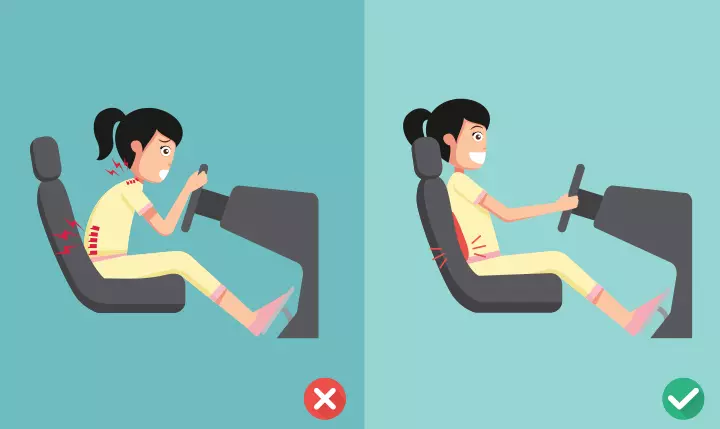
Frequently Asked Questions
1. Can I bend over and exercise while pregnant?
It may be safe to bend down and do some exercises if your doctor has not asked you to refrain from them. Some yoga poses that require bending over and may be safe for pregnant women include the downward dog pose, the triangle pose, and the wide-legged forward bending pose. These prenatal yoga poses may be safe for most women until the second trimester (16) (17). These poses may also aid in strengthening core muscles that provide support to your spine.
2. Does bending over when pregnant cause miscarriage?
There is no scientific evidence that bending during pregnancy increases the risk of miscarriage. However, if your job demands heavy physical involvement, you may want to reduce or avoid stooping and bending often during your pregnancy as it may increase risks for unfavorable birth outcomes as per the experts at CDC (2).
3. Are there any exercises that can help alleviate back pain caused by bending over during pregnancy?
Several pregnancy exercises help alleviate back pain caused by bending over during pregnancy. These include prenatal yoga and gentle stretching. According to a report by the American College of Obstetricians and Gynecologists (ACOG), standing backbend can help counteract the forward bending that occurs as your uterus grows (18). However, check with your doctor before beginning any workout program (8). They can tell you about the exercises to avoid during pregnancy and those that are safe.
4. Can bending over lead to premature labor?
Bending over in itself is not known to cause premature labor. However, if you have back pain during the second or third trimester, it could be a symptom of early labor. A healthcare provider should be consulted for thorough evaluation and guidance (19).
You might have heard from your mom or other elders at home not to bend over when pregnant as it may cause pain and other discomforts. Although they are right to some extent, most experts consider it safe to bend during pregnancy, provided you do it correctly. However, performing chores that require you to bend when pregnant can be demanding. Moreover, if your occupation requires frequent bending, it is essential to take medical advice to comprehend the safety aspects and prevent the risk of complications in pregnancy.
Infographic: Precautions To Follow While Bending Down During Pregnancy
During pregnancy, there may be a lot of restrictions on certain movements for your and your baby’s safety. One such action is bending. Many pregnant women struggle due to their growing bellies. So here are the tips on how to bend and how not to bend while pregnant to stay safe.
Some thing wrong with infographic shortcode. please verify shortcode syntax
Illustration: Is It Safe To Bend Over While Pregnant?
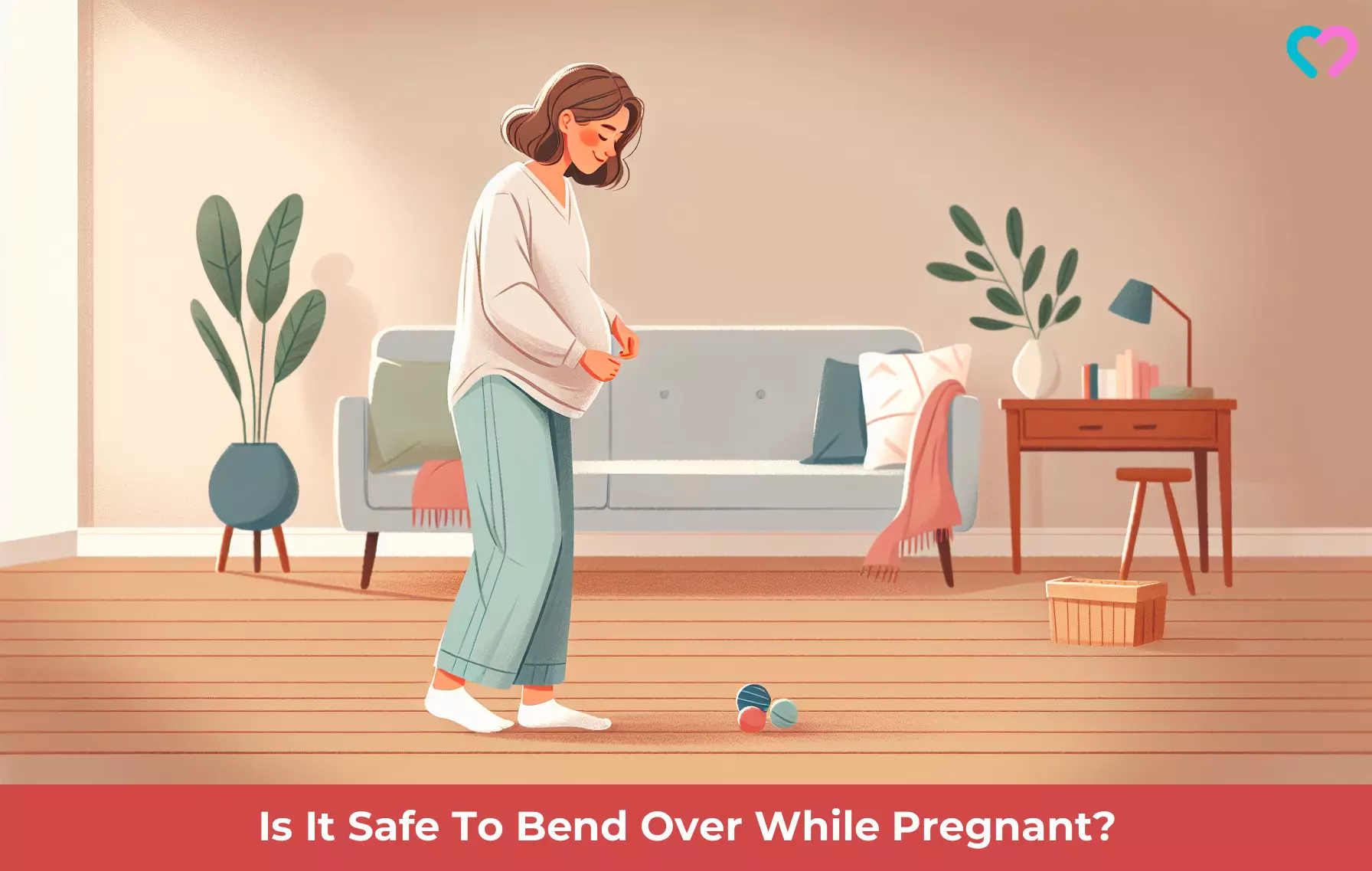
Image: Dall·E/MomJunction Design Team
Are you having difficulty with your mobility and bending over while pregnant? Watch this video to learn how to comfortably and safely bend over without any pain or excessive strain.
References
- Mark A Underwood et.al; (2005); Amniotic Fluid: Not Just Fetal Urine Anymore.
https://idp.nature.com/authorize?response_type=cookie&client_id=grover&redirect_uri=https%3A%2F%2Fwww.nature.com%2Farticles%2F7211290 - About Physical Job Demands and Reproductive Health.
https://www.cdc.gov/niosh/reproductive-health/prevention/physical-demands.html?CDC_AAref_Val=https://www.cdc.gov/niosh/topics/repro/physicaldemands.html - Exercise and Pregnancy Loss.
https://www.aafp.org/pubs/afp/issues/2015/0401/p437.html - L Fenster et.al; (1997); A prospective study of work-related physical exertion and spontaneous abortion.
https://pubmed.ncbi.nlm.nih.gov/9116099/ - Kaname Takeda et.al; (2015); Changes in balance strategy in the third trimester.
https://pmc.ncbi.nlm.nih.gov/articles/PMC4499990/ - Back Pain During Pregnancy.
https://www.acog.org/womens-health/faqs/back-pain-during-pregnancy - Bhavadharini Ramu et.al; (2010); Prevalence and risk factors for gastroesophageal reflux in pregnancy.
https://www.researchgate.net/publication/49652376_Prevalence_and_risk_factors_for_gastroesophageal_reflux_in_pregnancy - Feeling the burn? Tips to manage heartburn GERD in pregnancy.
https://utswmed.org/medblog/heartburn-gerd-pregnancy/ - Back Pain in Pregnancy.
https://www.urmc.rochester.edu/encyclopedia/content?contenttypeid=134&contentid=52 - Back Pain in Pregnancy.
https://www.hopkinsmedicine.org/health/conditions-and-diseases/staying-healthy-during-pregnancy/back-pain-in-pregnancy - Lifting While Pregnant.
https://americanpregnancy.org/healthy-pregnancy/is-it-safe/lifting-pregnancy/ - Pregnancy: Correct Posture & Body Mechanics.
https://my.clevelandclinic.org/health/articles/6913-pregnancy-correct-posture–body-mechanics - G Ahlborg Jr et.al; (1990); Heavy lifting during pregnancy–a hazard to the fetus? A prospective study.
https://pubmed.ncbi.nlm.nih.gov/2351529/ - Pregnancy and Posture.
https://www.urmc.rochester.edu/encyclopedia/content?contenttypeid=134&contentid=8 - Pregnancy and Posture.
https://www.hopkinsmedicine.org/health/conditions-and-diseases/staying-healthy-during-pregnancy/pregnancy-and-posture - Pregnancy Yoga Poses for the Second Trimester.
https://www.artofliving.org/in-en/yoga/yoga-sequences-for/pregnancy-yoga-poses-for-the-second-trimester - Yoga in pregnancy.
https://www.tommys.org/pregnancy-information/im-pregnant/exercise-in-pregnancy/yoga-pregnancy - Exercises During Pregnancy: 8 Exercises and Stretches You Can Do at Home.
https://www.acog.org/womens-health/infographics/exercises-during-pregnancy - Back pain in pregnancy.
https://www.nhs.uk/pregnancy/related-conditions/common-symptoms/back-pain/
Community Experiences
Join the conversation and become a part of our nurturing community! Share your stories, experiences, and insights to connect with fellow parents.
Read full bio of Dr. Sangeeta Agrawal
- Parmeet Kaur is a physiotherapist specializing in pelvic floor and vestibular rehabilitation. She earned her bachelor's degree in physiotherapy from Kurukshetra University and is currently practicing in Ontario, Canada.
 Parmeet Kaur is a physiotherapist specializing in pelvic floor and vestibular rehabilitation. She earned her bachelor's degree in physiotherapy from Kurukshetra University and is currently practicing in Ontario, Canada.
Parmeet Kaur is a physiotherapist specializing in pelvic floor and vestibular rehabilitation. She earned her bachelor's degree in physiotherapy from Kurukshetra University and is currently practicing in Ontario, Canada.
Read full bio of Rebecca Malachi
Read full bio of Swati Patwal
Read full bio of Dr. Joyani Das








